More than 100 years ago, Dr. Montessori created a method of education which focuses upon development of the whole child. Science and modern educational theory are only just now catching up with her. Through her work, she came to understand both the unique and universal needs of children. She was able to apply her scientific knowledge as a doctor in designing a classroom environment which considers every aspect of the child. Dr. Montessori laid out a philosophy which promotes peace, independence, respect and friendship. She designed manipulative, academic materials for an extremely broad range of abilities and created a method of training teachers to guide children through their own developmental pathways. At MAB we combine all of these elements with a faculty of master teachers to provide an authentic Montessori experience for each child and parent.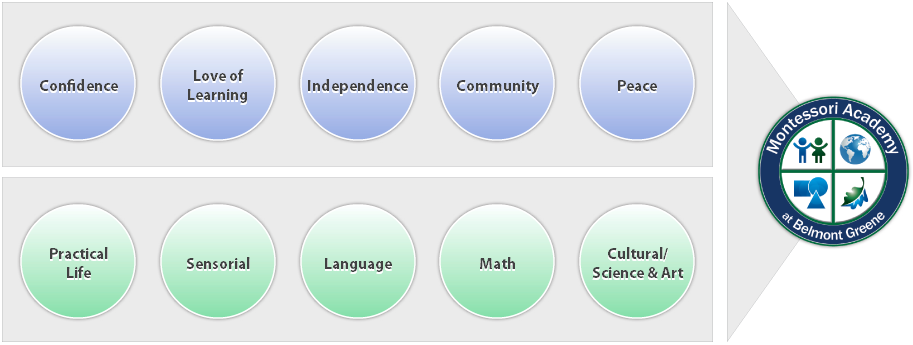
Confidence
 The Montessori classroom is filled with opportunities for success. However, lessons are designed and presented in a manner which allows the child to make mistakes and still find his own solution. Even the smallest successes, such as carrying a pitcher of water without spilling, build self-reliance. As a result, confidence grows. Likewise, cleaning up one’s own spill brings its own success as well. Children are given choices and responsibility and they have significant ownership in their classrooms. Each child learns to lead, follow and how to choose between the two. The resulting confidence is crucial to reinforcing the child’s understanding of himself. A knowledge of and confidence in one’s own abilities creates a desire to find new challenges and clears a path for life-long learning.
The Montessori classroom is filled with opportunities for success. However, lessons are designed and presented in a manner which allows the child to make mistakes and still find his own solution. Even the smallest successes, such as carrying a pitcher of water without spilling, build self-reliance. As a result, confidence grows. Likewise, cleaning up one’s own spill brings its own success as well. Children are given choices and responsibility and they have significant ownership in their classrooms. Each child learns to lead, follow and how to choose between the two. The resulting confidence is crucial to reinforcing the child’s understanding of himself. A knowledge of and confidence in one’s own abilities creates a desire to find new challenges and clears a path for life-long learning.
Love of Learning
 Children are born with an innate love of learning and a desire to refine their skills. There is a flame burning within each child which pushes him ever-forward to build the adult he or she will one day become. Montessori teachers are specially trained to nurture this love of learning to support the child’s effort. In the classroom, there is a freedom within limits. Teachers understand each child’s needs and interests so they can encourage him or her in the appropriate direction at the appropriate time. In so doing, the child develops the ability to make appropriate choices. This is known as “following the child.”
Children are born with an innate love of learning and a desire to refine their skills. There is a flame burning within each child which pushes him ever-forward to build the adult he or she will one day become. Montessori teachers are specially trained to nurture this love of learning to support the child’s effort. In the classroom, there is a freedom within limits. Teachers understand each child’s needs and interests so they can encourage him or her in the appropriate direction at the appropriate time. In so doing, the child develops the ability to make appropriate choices. This is known as “following the child.”
Independence
 Dr. Montessori observed that any unnecessary help to a child is a hindrance to his or her development. In general, parents, teachers and care givers have a tendency to do too much for our children -things that they can and want to do for themselves. Doing so diminishes the child’s innate drive and devalues the effort. In the Montessori environment, teachers look to step back as often as they step forward. Indeed, a goal of the Montessori teacher is that the child is working as if the teacher is not in the room.
Dr. Montessori observed that any unnecessary help to a child is a hindrance to his or her development. In general, parents, teachers and care givers have a tendency to do too much for our children -things that they can and want to do for themselves. Doing so diminishes the child’s innate drive and devalues the effort. In the Montessori environment, teachers look to step back as often as they step forward. Indeed, a goal of the Montessori teacher is that the child is working as if the teacher is not in the room.
Community
 Children are the future of our world. Yet our world is not simply 7 billion independent souls, but rather millions of connections which form groups, cultures and societies. In Montessori, from the earliest ages, children learn how their actions affect others. Through planned and unplanned social interactions as well as modeling by the teachers, children learn lessons of grace and courtesy. They are given the freedom to do right and the understanding of why. In this manner, the children develop empathy, consideration and the ability to make and maintain friendships.
Children are the future of our world. Yet our world is not simply 7 billion independent souls, but rather millions of connections which form groups, cultures and societies. In Montessori, from the earliest ages, children learn how their actions affect others. Through planned and unplanned social interactions as well as modeling by the teachers, children learn lessons of grace and courtesy. They are given the freedom to do right and the understanding of why. In this manner, the children develop empathy, consideration and the ability to make and maintain friendships.
Peace
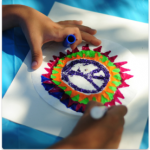 Peace is an essential human need. The Montessori method is often called “education for peace.” Peace is not simply the absence of war. It is the result of a collaborative effort to build and maintain the concepts of fairness, cooperation, responsibility, community, freedom of choice, acceptance and the empathy. Children learn the importance of peace through their work and social interactions. They are taught that peace often comes from within, but it must be practiced. Peace is also far easier to destroy than to create. Therefore it is important for each child to develop his own idea of peace, so that he can do his own work to build it.
Peace is an essential human need. The Montessori method is often called “education for peace.” Peace is not simply the absence of war. It is the result of a collaborative effort to build and maintain the concepts of fairness, cooperation, responsibility, community, freedom of choice, acceptance and the empathy. Children learn the importance of peace through their work and social interactions. They are taught that peace often comes from within, but it must be practiced. Peace is also far easier to destroy than to create. Therefore it is important for each child to develop his own idea of peace, so that he can do his own work to build it.
Practical Life
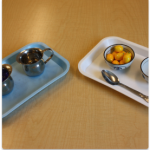 Also called Daily Living, the work in this section sets the stage for all that is to come. Concentration, the first essential of human development, is the main focus. However, through this work the child also learns patience, critical thought, independence and the ability to care for himself, others and his environment. From birth to three years old, the classroom is composed mostly of practical life work. Gradually, sensorial, language and math materials appear as the child approaches three years old. Over the next few years the child will spend a great deal of time with practical life work -not so much because the teacher directs him there, but because he is drawn there by his own internal interests.
Also called Daily Living, the work in this section sets the stage for all that is to come. Concentration, the first essential of human development, is the main focus. However, through this work the child also learns patience, critical thought, independence and the ability to care for himself, others and his environment. From birth to three years old, the classroom is composed mostly of practical life work. Gradually, sensorial, language and math materials appear as the child approaches three years old. Over the next few years the child will spend a great deal of time with practical life work -not so much because the teacher directs him there, but because he is drawn there by his own internal interests.
Sensorial
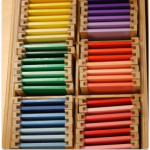 Each of the Montessori materials has been designed with direct and indirect aims. While the Sensorial materials deal directly with the development of the senses, the children also learn skills of gradation, critical thought, problem solving, pincer grip and preparation for math. Many of the Sensorial materials are self-correcting, but the lessons given by the teacher require increased patience and focus as the work becomes more complex.
Each of the Montessori materials has been designed with direct and indirect aims. While the Sensorial materials deal directly with the development of the senses, the children also learn skills of gradation, critical thought, problem solving, pincer grip and preparation for math. Many of the Sensorial materials are self-correcting, but the lessons given by the teacher require increased patience and focus as the work becomes more complex.
Language
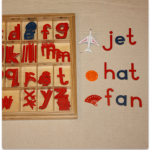 Montessori academics begin with concrete ideas and the child moves toward abstraction. There is almost always a tangible representation of the concept present in each work. This allows children to use their hands as a means of internalizing the work. Sounds are taught phonetically using sandpaper letters, a sand tray, pictures and objects and the children use the movable alphabet to build words in preparation for writing.
Montessori academics begin with concrete ideas and the child moves toward abstraction. There is almost always a tangible representation of the concept present in each work. This allows children to use their hands as a means of internalizing the work. Sounds are taught phonetically using sandpaper letters, a sand tray, pictures and objects and the children use the movable alphabet to build words in preparation for writing.
Math
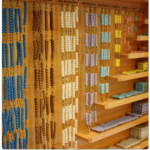 Once again, children are introduced math in a very concrete way. Before the symbol, the child experiences the quantity. Next the lessons attach the quantity to the symbol and throughout all of the operations of math, with any number children are always presented with the corresponding physical representation of the quantity. With the golden beads, children physically build numbers. Once numbers can be built, they can then be added to, multiplied, subtracted from or divided. In this manner, the children develop a strong foundation in mathematics.
Once again, children are introduced math in a very concrete way. Before the symbol, the child experiences the quantity. Next the lessons attach the quantity to the symbol and throughout all of the operations of math, with any number children are always presented with the corresponding physical representation of the quantity. With the golden beads, children physically build numbers. Once numbers can be built, they can then be added to, multiplied, subtracted from or divided. In this manner, the children develop a strong foundation in mathematics.
Cultural / Science & Art
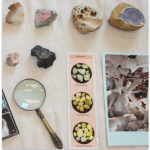 Though generally there is a defined area for these materials, elements of science, culture and art are integrated into all of the areas of the classroom. Children learn about the cultural and geographic world beyond the classroom walls through hands-on interaction and projects. Art is a part of every day, but the class also engages in larger scale projects where collaboration is emphasized. Children also learn about the scientific world by not only going out into nature, but bringing it into the classroom for up-close, guided research.
Though generally there is a defined area for these materials, elements of science, culture and art are integrated into all of the areas of the classroom. Children learn about the cultural and geographic world beyond the classroom walls through hands-on interaction and projects. Art is a part of every day, but the class also engages in larger scale projects where collaboration is emphasized. Children also learn about the scientific world by not only going out into nature, but bringing it into the classroom for up-close, guided research.
MAB
 Combining all of these elements is not easy. It requires significant training and constant learning on the part of the entire faculty from assistants and teachers to the head of school. A goal of the Montessori teacher is that as the child grows, the teacher’s importance diminishes. However, as with any pedagogy, the teacher’s ability to apply the philosophy has a significant impact on the quality of the program and the outcomes for the children. MAB knows this better than anyone – and it shows in our faculty.
Combining all of these elements is not easy. It requires significant training and constant learning on the part of the entire faculty from assistants and teachers to the head of school. A goal of the Montessori teacher is that as the child grows, the teacher’s importance diminishes. However, as with any pedagogy, the teacher’s ability to apply the philosophy has a significant impact on the quality of the program and the outcomes for the children. MAB knows this better than anyone – and it shows in our faculty.
At MAB we are owned and operated by the Theriot family. Beth, Bart, Larry and Jill. Our faculty is an extended family who have helped to build this school brick-by-brick – in some cases literally. Many of our teachers have been with us for 10 years. Some of our teachers have been with us since we opened our doors. In that time, our faculty has remained very consistent, but has grown in experience and knowledge. This consistency is not only extremely important for the children, but it has also created a solid school culture and strong school community. All of this adds up to an authentic Montessori experience for child and parent.
Contact us today!




